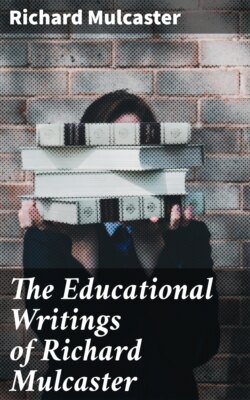Читать книгу The Educational Writings of Richard Mulcaster - Richard Mulcaster - Страница 29
На сайте Литреса книга снята с продажи.
Co-operation of Parents.
ОглавлениеTable of Contents
Seeing that the schoolmaster, to whose judgment I commend the choice, is no absolute potentate in our commonwealth, to dispose of people’s children as he pleases, but only a counsellor to act along with the parent, if the latter is willing to take advice, I should wish, that in order to have this duly accomplished, parents and teachers should be not only acquainted, but on friendly terms with each other. And though some parents need no counsel, and some teachers can give but little, yet the wise parent is always willing to listen before he decides, and the opinion of a skilful teacher deserves to be heard. If this co-operation cannot be established, the poor child will suffer in the present, and the parents will lose much satisfaction in the end. This kind of control will continue as long as the child is either under a master in school, or under a tutor in college, and in this period a great number may be very wisely arranged for, unlearned trades being sufficiently supplied, and a life of learning reserved for those only who by their intelligence and judgment are fitted for it. By such means the proportion will be properly adjusted in every branch of the public service, and the risk avoided of having too large a total number. This period under the master’s charge is the only period when the youth can be controlled by outside direction; for afterwards at a more dangerous age they come to choose for themselves, and their defects of nature and manners, if not corrected, may bring sorrow to them and to their friends. And though the schoolmaster may not always have his counsel followed in such a case, yet if he let the parent know his opinion his duty will be discharged. For if the parent shows himself unwilling to follow the teacher’s opinion, supported by good reasons, but under the influence of blind affection overestimates his child’s aptitude for learning, then though the master should for his own gain keep on an unpromising pupil, the fault lies with the parent who would not see even after fair warning. So that it always proves true that parents and teachers should be familiarly linked together in amity and continual conference for their common charge, and that each should trust in the judgment and personal goodwill of the other. This will come to pass only when the teacher is carefully chosen and kept on terms of friendly conference—not merely because “my neighbour’s children go to school with you, so you shall have mine too,”—a common reason in the case of children who are continually being sent posting about to try all sorts of schools, and never stay long in any, thus reaping as much learning as the rolling stone gathers moss.
